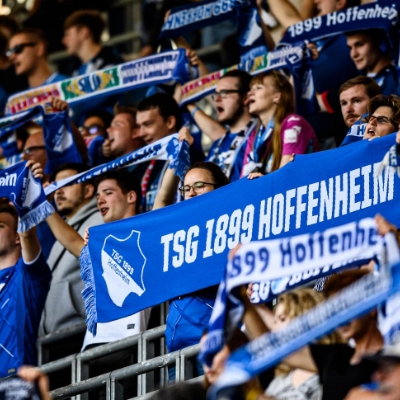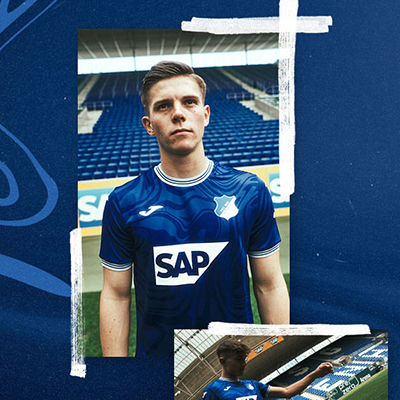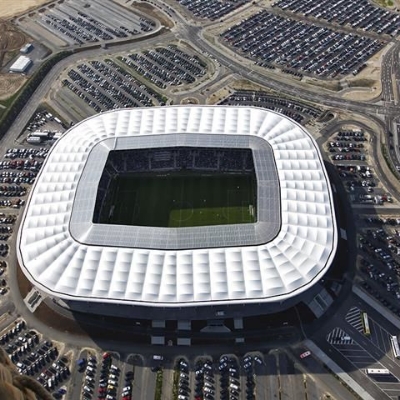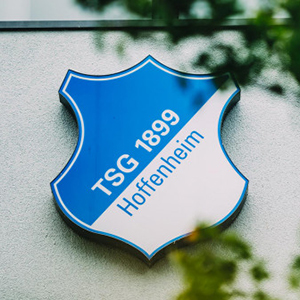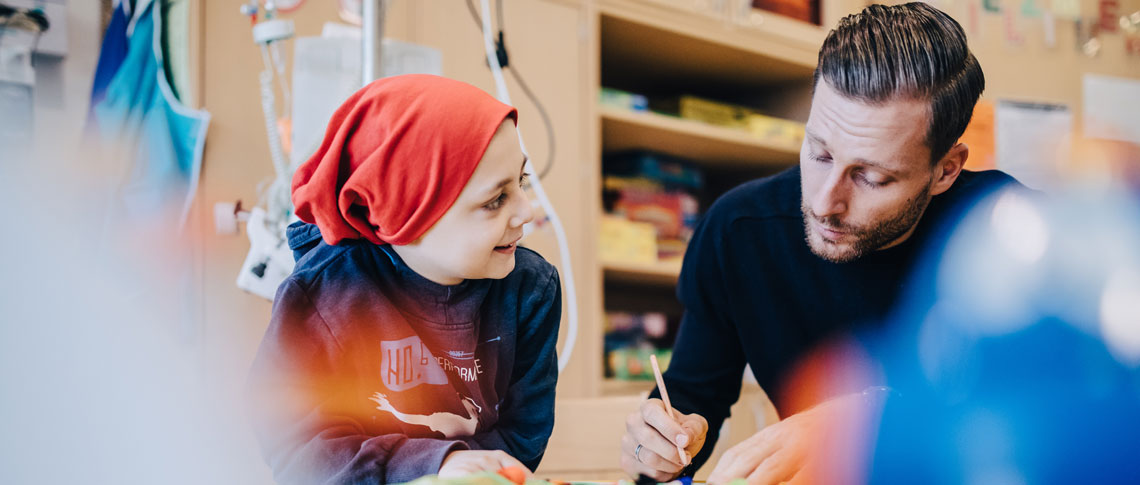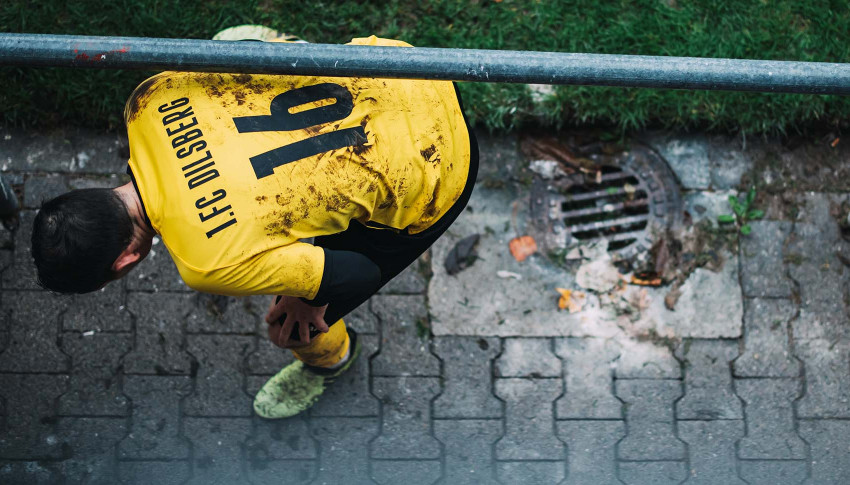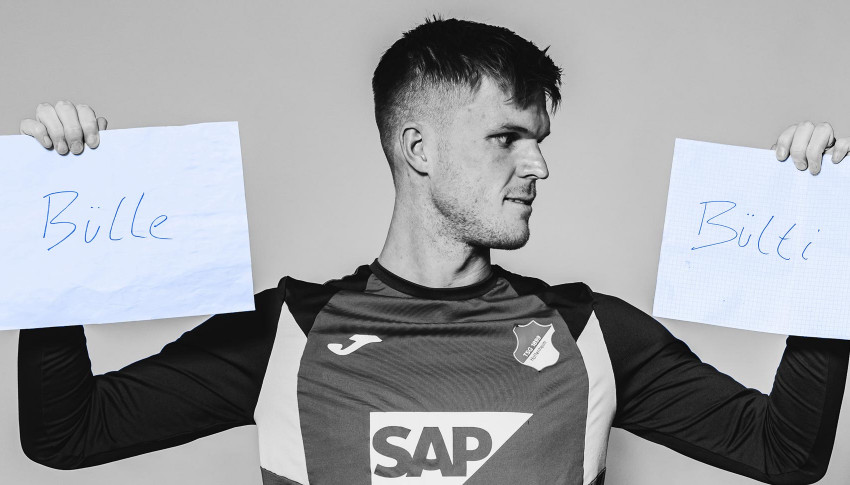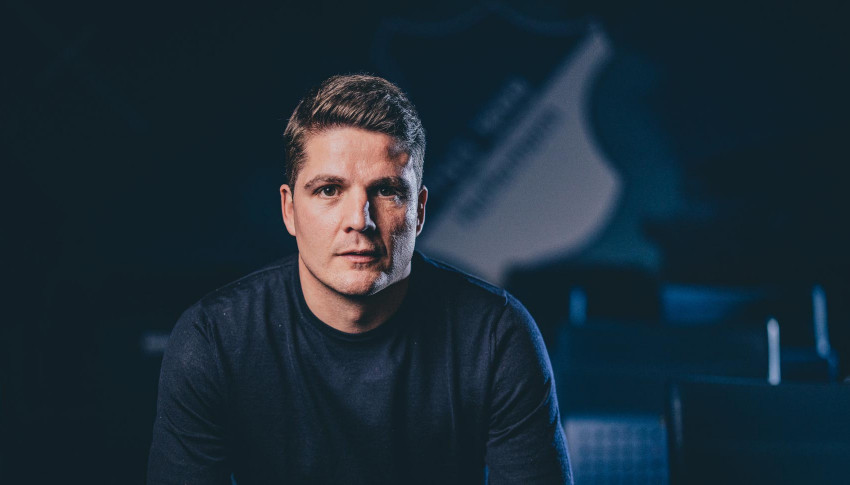Baumann: "It was really moving"
Oliver, a video clip entitled "Never give up" which starred a young lad and yourself was made recently. It illustrated the desire young children have to become footballers, to believe in something, to make their dreams come true. Can you remember how you started in goal?
"That was less romantic. My brother Sebastian, who's two years older than me, simply stuck me between the sticks when we were kids so that he could take shots at goal."
And it seemed you took to it.
"I actually started as an outfield player, but even as a child I really enjoyed jumping and flying around. I can still remember an exercise we used to do at the academy: shoot, then in goal, then come out of goal and queue up again. And when I queued up again, I used to fly around all over the place. I just went crazy, I thought it was mega cool.
It was the right decision. Nowadays you're a professional goalkeeper.
"Yes, but I didn't start as an eight-year-old with the aim of turning professional or earning a living from it later in life. I did it because it was incredibly fun for me, because I was desperate to play football."
And being a goalkeeper was the best fit for your personality?
"You need to be very unique. Being a goalkeeper is almost a sport in its own right. You're the odd one out. You have different training contents, complete different exercises away from the larger groups – and you're trying to stop the thing all fans want to see: goals. You're always the killjoy."
It's a role you have to like.
"Yes, I notice it in my everyday life too: there needs to be something unique about my car, only rarely in restaurants do I eat the food as it is on the menu. I probably am a bit quirky." (laughs)
"I have a responsibility"
Nowadays you're a Bundesliga goalkeeper with 286 appearances and you're a role model.
"Role model is a big word. But I have a responsibility. I have simply noticed how quick or relatively simple it is in my position to reach people or make them happy. Sometimes you only have to give kids a high-five and they're over the moon. And you think to yourself: that was pretty easy. We only enjoy this status because people love football so much. It's only thanks to the fans and the public interest that we ultimately earn our living. Without spectators and without fans, this hype wouldn't exist and we wouldn't be paid our wages. You simply have a responsibility to give something back."
Does that also mean giving people exposure?
"Everyone must discover that for themselves. What you notice is you can impact so many people and you have a huge reach. Many give this exposure in the form of Instagram, etc. Personally, I'm not a fan of that. I'm very inactive on social media. My private life is private and football is football. I want to keep them separate. There are lads in the football world who photograph everything."
"Everyone should live their lives how they want to"
Like golden steaks, you mean.
"Everyone should live their lives how they want to. I think this principle is important and that's why I don't judge others. Each person needs to decide how they want to portray themselves. If you like that kind of thing and you want to increase your exposure to your fans, that's fine. But once you press that button, it's out there in the world, everyone sees it and you can't undo it. There's often a fine line. In football, it's often about image. That means that sometimes it's not an entirely realistic world, but an artificial one in which many people play their roles."
Do you feel you're a part of this bubble?
"As a footballer I'm obviously part of it, but as a person I don't really feel I belong there. I think I simply had a good teacher in Christian Streich while I was in Freiburg. Alongside my parents, he helped to raise me. I joined Freiburg at D-Youth level and there he [Streich] was a formative figure. He placed a lot of emphasis on discipline, on staying grounded, on showing respect. Without Christian Streich, I wouldn't have become how I am today. Definitely not as approachable either, so I'm very thankful to him for that. He teaches you to see your life in its entirety, but that it requires a lot of discipline too."
How does that manifest itself in everyday life?
"Well I really used to like doing winter sports, but when I reached 13 or 14 I basically had to stop snowboarding overnight because the coach told me that it wasn't ideal due to the risk of injury. I simply forbid myself. In that respect there's a sense of responsibility – towards the club, which is now my employer. If I don't prepare myself 100 percent as well as I possibly can, it's not fair towards the club and the team. I will eat a burger from time to time, but I won't have several in a row." (laughs)
But it doesn't sound as though you would miss this aspect when your career is over one day in the distant future.
"There are some elements I would miss: the sport itself, the competition, your own fans. I've done it my whole life and it's what I'm used to. When we have summer holidays and I don't have anything to do in the first week, I get on my wife's nerves straightaway. But yes, there are some things I certainly won't [miss]."
Such as?
"I like being able to walk around town as a relative unknown, when not everyone everywhere always has an opinion that they want to tell you or to anonymously share with you over social media. I certainly won't miss this form of public life."
I guess it's one of those things that comes with the territory.
"Everything comes at a cost, even professional football. In addition to all the amazing elements, there are less pleasant aspects too. It's always a balancing act, always a question of priorities. I read a very interesting book on this topic once: 'Das Café am Rande der Welt' (The Café on the Edge of the World). It's about discovering the purpose of your own existence. About asking yourself: 'Why are you here? What are you aiming for? What are you living for?'"
Involvement in the children's cancer clinic in Heidelberg
One of your answers has been to get involved with charity, as you've been doing with your involvement in the children's cancer clinic in Heidelberg.
"Every person, every professional footballer must decide for themselves how they want to go about it. I don't want to tell anyone what they should be doing. In my mind, it's about drawing people's attention towards something. And if, in the process, I can help to draw attention to something like that [cancer among children] and bring people some happiness, then I'm very happy to do it. I find doing good things for other people to be a very rewarding experience. For me, an honest thankyou is very important – more so than many things. We didn't simply want to donate money and leave it at that. We want to be involved personally, to be approachable."
Why is it that you and your wife Charlotte are explicitly involved in the fight against cancer?
"There are several reasons behind it. One is that in Freiburg there was a young fan called Kilian who was ill with cancer. Now and again, his parents would come with him to training, to the matches and would ask for a photo or maybe even some gloves. We used to see him time and time again, we followed his life and witnessed his suffering for a certain period. Charlotte and I found it to be very moving."
That sounds like a very personal connection…
"Cancer has been something we have experienced in the family. I lost my father to the illness in 2012. He was only 62 years old at the time. It was an intense period. I played through the season with Freiburg like normal, then Charlotte and I had a holiday booked. Our first trip to the USA. And my father said: 'Yes, you should go.' But we felt that it might perhaps be too late if we came back on the date we had scheduled. We subsequently cancelled the trip, which was for the beginning of June. It was his birthday on 1 June, mine a day later and then on 4 June he passed away. It was very tough. It was then straight back to the training camp and normal life. But the real low for me came later because no-one can instantaneously absorb something like that."
And that's what moved you to do something in this field?
"With a bit of hindsight, we simply felt that we definitely wanted to do something – also for the people who work in this field and for the relatives of the people who are suffering with the illness. Because we ourselves have experienced how difficult that is. We're all fighting our own battles. Those who are ill are fighting for their lives. The others are fighting to establish a sense of normality, parents often for time or money. When people like me, due to the status that football gives me, have the opportunities or the ability to give something back to people now and again and to make them happy, then I see that as a responsibility I'm happy to assume. And the response you get is so incredibly genuine."






